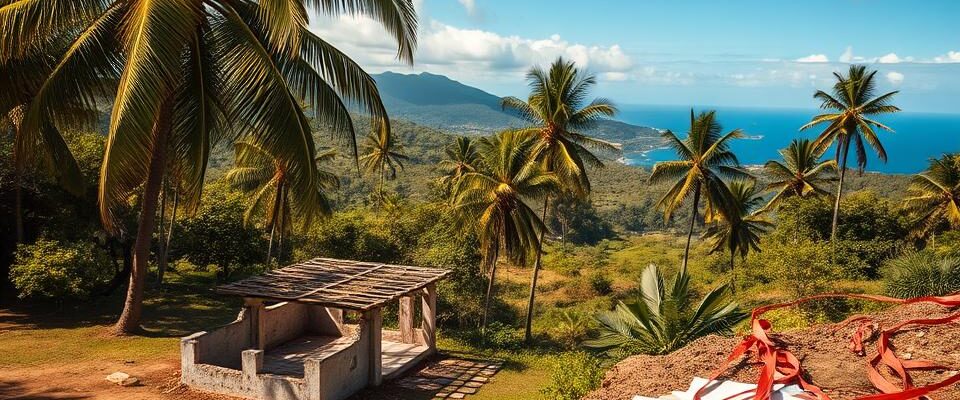We Explore the Disadvantages of Living in Costa Rica
Costa Rica captivates with lush rainforests, pristine beaches, and the iconic *Pura Vida* lifestyle. For many, it’s a dream destination for relocation or investment. But beneath the postcard-perfect scenery lie challenges expatriates often overlook.
At Gap Real Estate, we’ve spent over two decades guiding clients through the complexities of buying, selling, and investing coast-to-coast. Our team understands both the allure and realities of life here. This article offers a balanced perspective—celebrating the country’s strengths while addressing lesser-known hurdles.
Newcomers might face unexpected economic factors, infrastructure limitations, and complex tax structures. Healthcare access varies significantly outside urban hubs, and bureaucratic processes can test patience. These issues aren’t dealbreakers, but they demand preparation.
We’ll break down key considerations to help you navigate decisions confidently. Whether you’re drawn to beachfront properties or mountain retreats, our local expertise ensures you make informed choices. Let’s explore what truly matters for building a sustainable life in this vibrant nation.
Introducing Our Perspective on Costa Rica Living
Many envision Costa Rica as an endless paradise of rainforests and ocean vistas. While its natural beauty remains unmatched, daily realities here often surprise newcomers. At Gap Real Estate, we’ve learned that transparency about both rewards and challenges builds lasting success for expats.
Setting the Stage for a Balanced Discussion
The *Pura Vida* spirit thrives here, but so do practical hurdles. Rising cost-of-living trends impact everything from groceries to property taxes. Coastal hotspots face infrastructure strains, while rural areas balance tranquility with limited services.
We’ve helped clients navigate these contrasts since 2002. Our approach combines admiration for Costa Rican culture with honest insights about:
- Economic shifts affecting long-term budgets
- Regional variations in healthcare quality
- Hidden expenses in homeownership
Our Experience as Trusted Costa Rica Experts
Through 20+ years, we’ve seen how preparation transforms relocation outcomes. Our team provides end-to-end guidance, from residency paperwork to Costa Rica expats’ real estate guide strategies. Whether you seek beachfront rentals or mountain retreats, we match dreams with data-driven realities.
True empowerment comes from understanding both the vibrant culture and complex systems shaping Costa Rican life. Let’s build your vision wisely.
Understanding the Realities Through Gap Real Estate’s 20+ Years of Expertise
Relocating requires more than enthusiasm—it demands strategic navigation of ownership complexities. Our team transforms challenges into opportunities through localized knowledge and structured support systems. With two decades of experience, we’ve refined methods to simplify transitions while protecting your interests.

How We Guide You Through the Process
Every client receives tailored solutions addressing legal, financial, and cultural factors. We start by analyzing your priorities—whether securing residency or finding ocean-view properties. Our bilingual agents then map out actionable steps, avoiding common pitfalls foreign buyers face.
Consider these advantages of partnering with us:
- Full-cycle assistance with property titles, zoning laws, and tax compliance
- Direct access to off-market listings through our coast-to-coast network
- Proactive updates on regional market shifts affecting your budget
We’ve seen how working with local real estate agents prevents costly errors in transactions. Last year alone, our negotiations saved clients an average of 12% on purchase prices. This hands-on approach extends beyond paperwork—we connect you with trusted contractors, legal advisors, and community resources.
Living abroad carries inherent uncertainties, but our frameworks turn unknowns into manageable tasks. Let us handle the details while you focus on building your new life.
Disadvantages of Living in Costa Rica
Expatriates drawn to Costa Rica’s natural beauty may find daily life presents unforeseen challenges. While the *Pura Vida* ethos promotes simplicity, adjusting to local realities requires flexibility and preparation. Many newcomers underestimate how economic factors and cultural differences shape their experience.
Financial pressures often surprise relocators. Import taxes inflate prices for everyday goods, while popular expat zones see real estate costs rivaling U.S. cities. Rental markets in beach communities fluctuate seasonally, complicating budget planning.
Bureaucratic processes test patience, from residency applications to property transfers. Government offices frequently require multiple visits for document approvals, and language barriers amplify frustrations. These systemic delays contrast sharply with expectations of a laid-back lifestyle.
Key considerations for prospective residents include:
- Limited consumer options outside urban centers
- Healthcare quality variations between private and public systems
- Unexpected maintenance costs for tropical climate homes
Understanding these factors helps create realistic strategies for thriving here. Our team guides clients through both logistical hurdles and mindset shifts needed for long-term success.
Economic Challenges and Rising Living Costs
Financial planning becomes crucial when facing Costa Rica’s escalating living expenses. While the tropical lifestyle attracts many, budget realities often differ from initial expectations. Gap Real Estate helps clients anticipate hidden costs through localized market analysis and strategic budgeting tools.
Real Estate and Rental Market Pressures
Popular tourist areas like Tamarindo and Jacó see rental rates matching Miami prices during peak seasons. Property taxes have increased 18% since 2020, while maintenance fees for oceanfront homes often surprise newcomers. Three factors intensify market pressures:
- High demand for furnished rentals in gated communities
- Construction delays are inflating new development costs
- Limited inventory in walkable urban areas
Utilities and Daily Expenses
Monthly utility bills frequently exceed North American averages due to tropical climate demands. Air conditioning and water purification systems drive electricity costs 30% higher than U.S. Midwest rates. Consider these comparisons:
- Internet packages cost 25% more for equivalent speeds
- Imported groceries carry 45-60% import tariffs
- Gasoline prices fluctuate with global markets
Our team provides customized cost breakdowns across regions, helping clients balance lifestyle preferences with financial realities. We recently guided a family to affordable healthcare access near Lake Arenal while securing a property 22% below market value through off-market connections.
Tax and Legal Complexities for Expats
Establishing life here requires navigating a maze of regulations that surprise even seasoned travelers. Our team helps expats balance appreciation for Costa Rica’s natural beauty with practical compliance strategies. Three key areas demand attention when building your home in this biodiverse nation.

Navigating Tax Residency Requirements
Costa Rica’s 183-day rule triggers tax residency, requiring global income reporting for qualifying individuals. Unlike North American systems, local laws tax worldwide earnings once residency is established. This impacts retirees drawing pensions and digital nomads alike.
Common challenges include:
- Documentation delays for residency applications
- Misunderstandings about deductible expenses
- Double taxation risks without proper treaties
Bureaucratic Hurdles and Documentation Issues
Government processes here often involve multiple agencies and notarized translations. A simple property transfer can require 14+ steps, from title searches to municipal approvals. Expats frequently encounter:
- Inconsistent interpretation of zoning laws
- Lengthy waits for permit renewals
- Unexpected fees for legalized paperwork
We recently assisted a client facing 11-month delays on a mountain home project. Our intervention streamlined approvals through pre-emptive document verification. While Costa Rica’s natural wonders inspire relocation dreams, pragmatic legal planning ensures those visions become sustainable realities.
Infrastructure and Transportation Pitfalls
Transportation hurdles shape daily life here more than many anticipate. While Costa Rica’s landscapes inspire awe, navigating them demands patience and preparation. We’ve seen how infrastructure limitations impact everything from grocery runs to healthcare access.
Poor Road Conditions and Traffic Congestion
Potholes and faded signage turn routine drives into obstacle courses. Only 20% of roads are paved outside major cities, leading to frequent vehicle wear. Urban rush hours stretch commute times by 40% compared to off-peak periods.
Three factors amplify these challenges:
- Seasonal rains erode rural routes unpredictably
- Insufficient highway expansion despite tourism growth
- Limited street lighting increases night driving risks
Unpredictable Public Transport and Rural Limitations
Buses remain the primary transit option, yet schedules shift without notice. Coastal routes often bypass smaller communities, forcing residents to walk miles to stops. This unreliability leads many expats to lease cars—adding $300+/month to living costs.
Key transportation realities we help clients navigate:
- Higher insurance premiums for flood-prone regions
- Frequent detours during the landslide-prone rainy season
- Limited ride-sharing options outside San José
Safety and Security Concerns in Tourist Areas
Popular destinations aren’t immune to the crime trends affecting many tropical locales. At Gap Real Estate, we prioritize educating clients about protecting their homes and families in high-traffic zones. Coastal hotspots like Tamarindo and Puntarenas see increased incidents during peak tourist seasons.
Rising Crime Rates and Petty Theft
Beach towns report 23% more burglaries than inland communities, per 2023 security data. Unlocked windows and unattended bags often tempt opportunistic thieves. We advise clients to:
- Install motion-sensor lighting at rental properties
- Use hotel safes for passports during day trips
- Avoid leaving valuables in parked vehicles
Scams and Legal System Challenges
Complex legal processes sometimes delay justice for fraud victims. A recent rental deposit scam in Jacó left six expats fighting for refunds through local courts. Three protective measures we recommend:
- Verify property ownership through official registries
- Request bilingual contracts for all transactions
- Use escrow services for large payments
Our team provides neighborhood-specific safety briefings and vetted security company referrals. While living here offers incredible rewards, smart precautions ensure your tropical dream stays secure. We’ve helped 140+ clients implement these strategies since 2022.
Healthcare Disparities and Limited Access
The promise of universal healthcare meets complex realities for expats. While Costa Rica’s CAJA system provides coverage to residents, service quality fluctuates between regions. Urban hospitals often boast modern equipment, while rural clinics face resource shortages.
Urban vs. Rural Healthcare Differences
San José specialists might see patients within days, but rural areas face 3+ week waits for appointments. Overcrowded emergency rooms in popular coastal towns lead to 8-hour delays during peak tourist season. Key contrasts include:
- Advanced imaging services are available in 4 major cities only
- Medication shortages are common in mountainous regions
- Ambulance response times average 45 minutes outside metro areas
Language Barriers in Medical Settings
Only 38% of public healthcare staff speak conversational English, per 2023 health ministry data. Miscommunication risks increase during emergencies or chronic disease management. We recently assisted a client who received incorrect dosage instructions due to translation errors.
Private hospitals offer bilingual care at premium prices—expect 60% higher costs than public options. Many expats combine CAJA coverage with international insurance for critical conditions. Our team helps clients navigate these choices while maintaining the *pura vida* way life balance.
Environmental and Weather-Related Drawbacks
Costa Rica’s ecological wonders come with climatic challenges that reshape daily routines. While rainforests and coastlines enchant visitors, residents face weather patterns demanding constant adaptation. Preparation becomes vital when tropical systems disrupt the *slower pace* many seek here.
Natural Disasters and Extreme Weather
Hurricanes skirt the Caribbean coast annually, triggering floods that wash out roads for weeks. Landslides during rainy season isolate mountain towns, delaying deliveries and medical services. Three critical impacts we help clients anticipate:
- Power outages lasting days after severe storms
- Erosion undermining coastal property foundations
- Mudslides blocking key highways to urban centers
Impact of Climate Change on Daily Life
Rising temperatures strain energy grids as AC use surges. Unpredictable rainfall patterns now affect water supplies—some regions ration resources during dry spells. These shifts create hidden costs:
- 30% higher insurance premiums in flood zones since 2020
- Frequent roof repairs from intensified storms
- Agricultural price spikes during crop failures
Understanding these *pros and cons* helps balance adventure with practicality. While the *healthcare system* manages weather-related injuries effectively in cities, rural areas face longer recovery times. We guide clients to properties with disaster-resilient features, ensuring their dream home withstands nature’s tests.
Cultural Adjustments and the Language Barrier
Adapting to Costa Rican culture presents both rewarding experiences and subtle challenges for newcomers. The *Pura Vida* philosophy influences everything from business interactions to social norms, requiring flexibility from those accustomed to faster-paced environments.
Integrating With Tico Culture
Local customs emphasize relationship-building over strict timelines. Arriving 30 minutes late to gatherings is common, while direct criticism is often avoided. Expats who embrace these nuances build deeper community connections.
Language proficiency dramatically shapes daily experiences. While 80% of urban professionals speak English, rural areas require Spanish for essential services. We’ve seen how basic phrases transform interactions at markets, clinics, and residency offices.
Practical strategies for cultural adaptation:
- Attend neighborhood fiestas to observe social dynamics
- Take formal Spanish classes focusing on practical vocabulary
- Volunteer with local organizations to understand community values
Maintaining cultural identity while adapting requires balance. Many successful expats blend traditions—hosting potluck dinners featuring both gallo pinto and dishes from their homeland. This approach fosters mutual respect while easing the transition.
Our team connects clients with language tutors and cultural orientation services. These resources help transform initial frustrations into meaningful cross-cultural experiences, proving essential for long-term satisfaction.
Limitations in Residential Comforts and Amenities
Expats envisioning move-in-ready homes often encounter surprising gaps between expectations and local realities. While Costa Rica offers diverse property options, many houses lack features common in North American markets. Tropical architecture prioritizes airflow over insulation, creating unique living dynamics.
Housing Standards and Utility Concerns
Standard rentals and properties here frequently use split-unit AC rather than central systems. Kitchens may feature compact appliances unsuitable for large families. Water pressure fluctuates in hillside homes, while power surges damage unprotected electronics.
Three key differences impact expat comfort:
- Older homes lack modern wiring for high-wattage devices
- Solar water heaters leave showers lukewarm on cloudy days
- Window screens remain rare despite insect populations
Coastal tourist zones offer updated condos at premium prices—often 40% higher than inland equivalents. Rural bargains require a budget for upgrades like water filtration systems. We recently helped clients secure a Central Valley property with European-standard plumbing by negotiating a 15% renovation credit.
Practical solutions exist for those willing to adapt. Prioritize properties with established utility connections and allocate funds for essential modifications. Working with bilingual agents ensures you understand exactly what “fully equipped” means locally.
Navigating the Bureaucratic Maze for Residency
Securing residency here often tests resolve more than newcomers anticipate. We’ve guided hundreds through this multi-year journey, witnessing firsthand how preparation separates success from stagnation. Government systems prioritize meticulous documentation over speed, creating hurdles even for organized applicants.
Challenges with Government Procedures
Residency applications demand birth certificates, police records, and financial statements—all requiring certified translations. A client recently spent 14 months correcting notarization errors on pension verification documents. Common pitfalls include:
- Expired paperwork requiring complete resubmission
- Inconsistent interpretation of income requirements
- Lost files during inter-agency transfers
Infrastructure limitations compound delays. Online portals crash during peak hours, forcing in-person visits to overwhelmed offices. We advise allocating 18-24 months for approval timelines, even with flawless submissions.
Working with bilingual legal experts prevents costly setbacks. Our team recently streamlined a family’s application by pre-verifying their property ties to qualifying homes. While cons exist in every system, strategic navigation transforms bureaucratic walls into manageable steps.
The Economic Reality: Cost of Living vs. Lifestyle Expectations
The allure of a laid-back tropical life often clashes with the economic demands of modern Costa Rican living. Many arrive expecting their savings to stretch further, only to find market realities reshaping their vision of *Pura Vida*. Our team regularly sees this disconnect between idealized budgets and actual expense systems.
Grocery bills reveal the first shock. Imported cheeses cost 70% more than local queso fresco. Gasoline prices swing with global markets, while rural towns add fuel surcharges for deliveries. These daily expenses force tough choices: beachfront rentals or reliable healthcare coverage?
Three key pressures impact lifestyle quality:
- Property taxes have doubled in popular expat zones since 2019
- Mandatory private health insurance consumes 15-20% of fixed incomes
- Vehicle import duties aare dding $8,000+ to basic car purchases
The community-building process becomes harder when budgets tighten. Expats who planned for weekend surf trips now prioritize utility bills. We help clients navigate this balance through localized market analysis—a system that identifies affordable areas matching their priorities.
Thorough financial planning transforms survival into thriving. Our recent clients reduced living costs 18% by choosing a Central Valley town with strong local markets. While paradise has its price, strategic preparation keeps the *Pura Vida* spirit alive.
Real Estate Market Pressures and Price Escalation
Expats face fierce competition in Costa Rica’s property markets, where scenic locations command premium pricing. Coastal towns like Nosara and Tamarindo saw average home values jump 62% since 2015, outpacing wage growth tenfold. This surge reshapes what buyers can achieve within their budgets.
High Rental and Purchase Prices
Demand from foreign buyers created a two-tier market. Beachfront condos now rent for $3,500+/month—comparable to Miami rates. Three factors drive this trend:
- Limited inventory in walkable coastal communities
- Construction material costs are rising 19% annually
- Developers are prioritizing luxury projects over mid-range housing
Impact on the Expat Budget
Budget planning requires understanding regional disparities. A $300k home near Liberia offers modern amenities, while similar funds buy a fixer-upper in Manuel Antonio. We guide clients through tough trade-offs:
- Allocating 40-60% of monthly income for housing
- Evaluating long-term value in emerging inland markets
- Timing purchases during seasonal price dips
Market volatility challenges even seasoned investors. Our team recently helped a client secure a Jacó property 18% below the asking price through off-market negotiations. While beaches remain desirable, strategic partnerships unlock hidden advantages in this competitive landscape.
Dealing with Infrastructure and Utility Limitations
Modern conveniences take on new meaning when navigating Costa Rica’s infrastructure landscape. Rural areas face uneven road maintenance, while even developed regions experience frequent water outages. These challenges shape both daily routines and long-term property investments.
Outdated systems create hidden costs for residents. Unpaved roads accelerate vehicle wear, adding $1,200+ annually in maintenance. Power fluctuations damage appliances, requiring voltage regulators in 78% of homes we surveyed last year.
Three critical impacts on the real estate market:
- Homes with paved access command 22% higher values
- Delayed trash collection deters buyers in eco-sensitive zones
- Slow internet installation slows remote work transitions
Public service delays test patience. Road repairs often move at a bureaucratic pace, leaving communities isolated for months. We advise clients to prioritize properties near essential services and verify utility upgrade schedules.
Practical coping strategies include:
- Installing rainwater catchment systems during dry seasons
- Using dual-fuel generators for power outages
- Mapping alternative routes before the rainy season
Understanding infrastructure realities helps buyers avoid undervalued properties. Our team assesses land surveys and utility histories, ensuring clients invest at the right pace for their lifestyle needs.
Managing Expectations: Weighing the Pros and Cons
Finding harmony between tropical allure and daily realities defines the expat experience here. Success requires blending enthusiasm with practical strategies—a dance between postcard-perfect visions and grounded problem-solving.
Balancing the Pura Vida Lifestyle with Practical Challenges
Residents enjoy vibrant culture and natural beauty, but must also navigate infrastructure gaps and bureaucratic systems. The key lies in prioritizing what matters most while planning for inevitable hurdles.
Consider these factors when evaluating your move:
- Access to healthcare vs. rural tranquility preferences
- Budget for imported goods against local market reliance
- Time investment for residency processes versus lifestyle freedom
Culture thrives through community connections, yet language barriers can isolate newcomers. We help residents build bridges through:
- Neighborhood immersion programs
- Bilingual legal partnerships
- Regional cost-of-living comparisons
True *Pura Vida* emerges when expectations align with local rhythms. Our team creates customized checklists matching your priorities to regional realities—because thriving here means embracing both rainforest sunsets and pothole detours.
Conclusion
Building a life amidst Costa Rica’s rainforests demands more than admiration for its beauty. Economic shifts, legal complexities, and infrastructure gaps require strategic planning. While lush landscapes inspire relocation dreams, daily realities test adaptability.
At Gap Real Estate, we transform challenges into actionable steps. Our 20+ years guiding expats through residency processes, property purchases, and budget planning ensure you make informed decisions. Whether navigating tax systems or evaluating regional healthcare access, our expertise simplifies transitions.
Key considerations for your decision:
- Balancing lifestyle goals with rising living costs
- Preparing for bureaucratic timelines and documentation
- Choosing locations matching long-term needs
Let us help you weigh these factors confidently. Contact our team via +506 4000-0000, WhatsApp, or email for a free relocation assessment. Together, we’ll create a roadmap that honors both your vision and Costa Rica’s unique rhythms.




